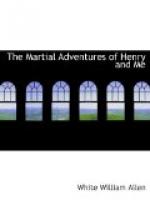After one o’clock the bombing stopped. Some other cross-road was taking its turn. Five men were buried that night in the little cemetery there by the dugout. We stood or sat about for a while! no one had much to say. The grey mist thickened and enveloped us. And we became as very shadows ourselves. Somewhere in the mist up the hill, near where the rocket’s red glare flushed on the dim horizon, a man began whistling the intermezzo from “Thais.” It fitted the unreality of the scene, and soon two of us were whistling together. He heard me and paused. Then we walked toward one another whistling and met. It was the Gilded Youth from the ship—the Gilded Youth whose many millions had made him shimmer. He was not shimmering there on the sloppy hillside. He was a field service man, and we went back to his machine and sat on it and talked music—music that seemed to be the only reality there in the midst of death, and the spirit that was moving men in the moonlight to forget death for something more real than death. And so it came about that the crescendo of our talk ran thus:
And courage—that thing which the Germans thought was their special gift from Heaven, bred of military discipline, rising out of German kultur—we know now is the commonest heritage of men. It is the divine fire burning in the souls of us that proves the case for democracy. For at base and underneath we are all equals. In crises the rich man, the poor man, the thief, the harlot, the preacher, the teacher, the labourer, the ignorant, the wise, all go to death for something that defies death, something immortal in the human heart. Those truck-drivers, those mule whackers, those common soldiers, that doctor, these college men on the ambulances are brothers tonight in the democracy of courage. Upon that democracy is the hope of the race, for it bespeaks a wider and deeper kinship of men.




